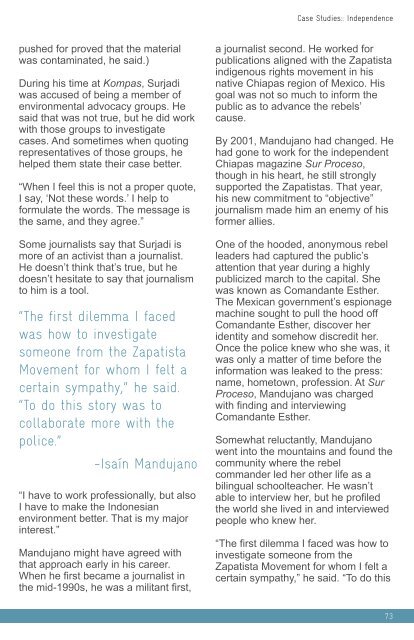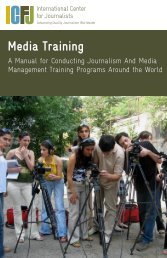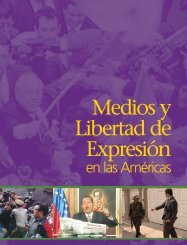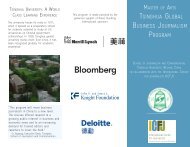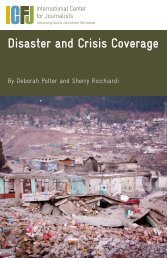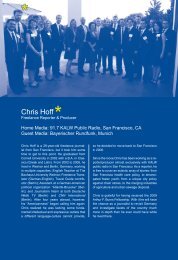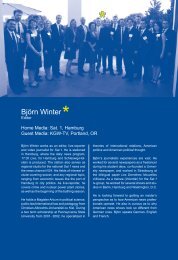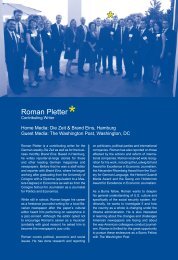Download PDF - International Center for Journalists
Download PDF - International Center for Journalists
Download PDF - International Center for Journalists
Create successful ePaper yourself
Turn your PDF publications into a flip-book with our unique Google optimized e-Paper software.
Case Studies:: Independence<br />
pushed <strong>for</strong> proved that the material<br />
was contaminated, he said.)<br />
During his time at Kompas, Surjadi<br />
was accused of being a member of<br />
environmental advocacy groups. He<br />
said that was not true, but he did work<br />
with those groups to investigate<br />
cases. And sometimes when quoting<br />
representatives of those groups, he<br />
helped them state their case better.<br />
“When I feel this is not a proper quote,<br />
I say, ‘Not these words.’ I help to<br />
<strong>for</strong>mulate the words. The message is<br />
the same, and they agree.”<br />
Some journalists say that Surjadi is<br />
more of an activist than a journalist.<br />
He doesn’t think that’s true, but he<br />
doesn’t hesitate to say that journalism<br />
to him is a tool.<br />
“The first dilemma I faced<br />
was how to investigate<br />
someone from the Zapatista<br />
Movement <strong>for</strong> whom I felt a<br />
certain sympathy,” he said.<br />
“To do this story was to<br />
collaborate more with the<br />
police.”<br />
-Isaín Mandujano<br />
“I have to work professionally, but also<br />
I have to make the Indonesian<br />
environment better. That is my major<br />
interest.”<br />
Mandujano might have agreed with<br />
that approach early in his career.<br />
When he first became a journalist in<br />
the mid-1990s, he was a militant first,<br />
a journalist second. He worked <strong>for</strong><br />
publications aligned with the Zapatista<br />
indigenous rights movement in his<br />
native Chiapas region of Mexico. His<br />
goal was not so much to in<strong>for</strong>m the<br />
public as to advance the rebels’<br />
cause.<br />
By 2001, Mandujano had changed. He<br />
had gone to work <strong>for</strong> the independent<br />
Chiapas magazine Sur Proceso,<br />
though in his heart, he still strongly<br />
supported the Zapatistas. That year,<br />
his new commitment to “objective”<br />
journalism made him an enemy of his<br />
<strong>for</strong>mer allies.<br />
One of the hooded, anonymous rebel<br />
leaders had captured the public’s<br />
attention that year during a highly<br />
publicized march to the capital. She<br />
was known as Comandante Esther.<br />
The Mexican government’s espionage<br />
machine sought to pull the hood off<br />
Comandante Esther, discover her<br />
identity and somehow discredit her.<br />
Once the police knew who she was, it<br />
was only a matter of time be<strong>for</strong>e the<br />
in<strong>for</strong>mation was leaked to the press:<br />
name, hometown, profession. At Sur<br />
Proceso, Mandujano was charged<br />
with finding and interviewing<br />
Comandante Esther.<br />
Somewhat reluctantly, Mandujano<br />
went into the mountains and found the<br />
community where the rebel<br />
commander led her other life as a<br />
bilingual schoolteacher. He wasn’t<br />
able to interview her, but he profiled<br />
the world she lived in and interviewed<br />
people who knew her.<br />
“The first dilemma I faced was how to<br />
investigate someone from the<br />
Zapatista Movement <strong>for</strong> whom I felt a<br />
certain sympathy,” he said. “To do this<br />
73


